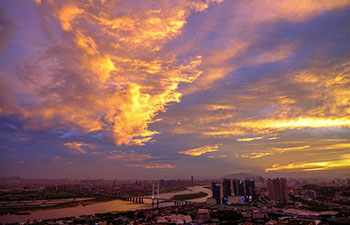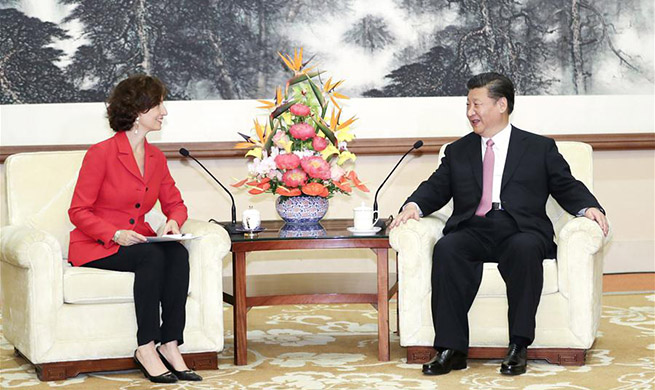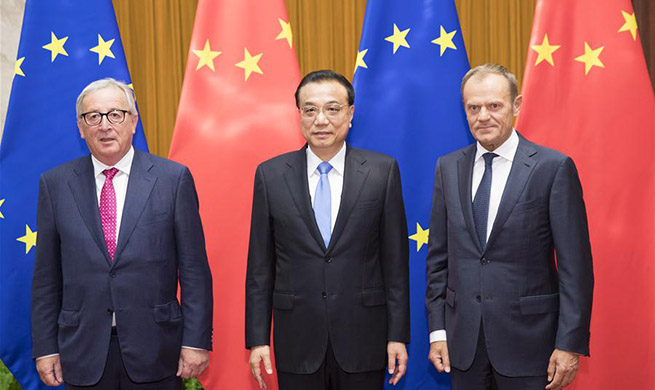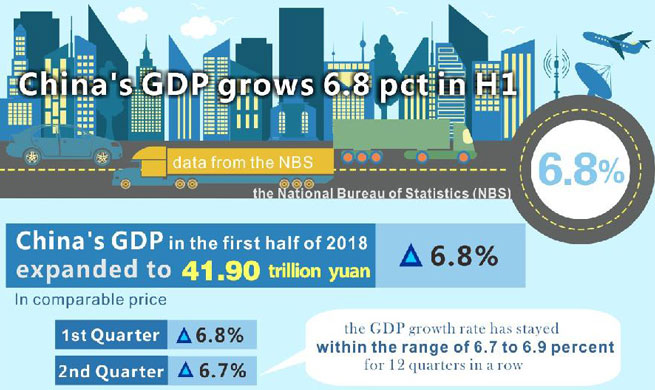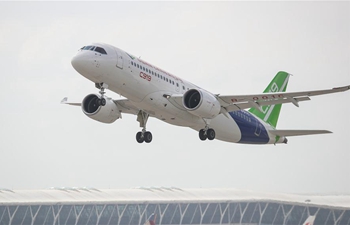by Stefania Fumo
ROME, July 16 (Xinhua) -- Comments by Deputy Prime Minister Luigi Di Maio that Italy won't ratify the EU-Canada Comprehensive Economic and Trade Agreement (CETA) have sparked controversy in Italy.
Under the deal, which entered into force provisionally after European Parliament's approval in September 2017, Canada agreed to remove customs duties on EU exports worth 400 million euros (468 million U.S. dollars) a year, according to the European Commission.
The treaty must now be ratified by the parliament of each EU country to enter into full effect. Last Friday, Di Maio, who is from the populist Five Star Movement and who also serves as labor and industry minister, said that "this parliamentary majority will refuse" to ratify the CETA.
"We must defend ourselves and our economy," Di Maio told Coldiretti farmers' association in a televised speech. "If even one Italian official representing Italy abroad continues to defend nefarious treaties such as the CETA, he will be removed."
The food and agriculture sector is Italy's second-largest exporter after manufacturing, with 40 billion euros' worth of exports a year, according to Coldiretti, which opposes the CETA and which represents 1.6 million Italian farms and agricultural businesses employing an estimated 300,000 people across the country.
However, Di Maio's comments sparked opposition from Confindustria industrialists' association and even from Italian Economy Minister Giovanni Tria.
"Not ratifying CETA would be a serious error," Confindustria President Vincenzo Boccia tweeted on Friday. "The CETA is advantageous for Italy because we are an exporter country and through exports we create wealth."
According to SACE export credit and business insurance company, which is wholly owned by Italy's public investment bank Cassa Depositi e Prestiti (CDP), Italian exports "performed brilliantly" in 2017 (+7.4 percent) and are expected to grow by 5.8 percent this year.
In spite of "uncertainties and market volatility", Italian exports should reach 500 billion euros by 2019 and surpass 540 billion euros by 2021, according to a SACE study published in June this year.
Italy posted trade surplus of almost 14 billion euros and exports grew 3 percent in January-May this year compared to the same period last year, ISTAT national statistics institute reported Monday.
The leading export sectors were metal products (+6.4 percent), followed by food, beverages and tobacco (+4.9 percent), pharmaceuticals (+4.7 percent), and textiles, clothing, leather and accessories (+3.6 percent), ISTAT said.
"My personal opinion is that free trade ... is always a good thing," commented Tria, according to Il Sole 24 Ore business paper. "But we must take a look at how these trade agreements are made -- the devil is always in the details."
One of those devilish details, according to Coldiretti, lies in the fact that the CETA does little to protect Italian products with denomination of origin labels, such as its famous wines, cheeses, and hams.
"This treaty creates a dangerous precedent," Bazzana told Xinhua. "Its fine print contains elements that we have never accepted with any other countries. For example, a Canadian producer will be allowed to make imitation Parmesan cheese, as long as the label describes it in English and doesn't use the Italian word 'Parmigiano'."
This means it will be difficult when negotiating trade treaties with Japan or the South American trade bloc, Mercosur, to tell those countries that they must respect Italian products, said Bazzana.
Another issue is the use of herbicides containing glyphosate, which is widespread in North America but controversial in the EU.
The European Parliament in October last year voted to ban the substance entirely by 2022, however the following month the European Commission renewed glyphosate approval for five years, saying "that there is no link between glyphosate and cancer in humans."
In Italy, the herbicide is banned from parks, recreational areas, schools, and any areas where it might seep into the groundwater. It is also banned in farming if it is used for the sole purpose of increasing crop yields, according to Italy's National Environmental Protection and Research Institute (ISPRA).
Bazzana made the example of glyphosate-treated dried lentils and beans imported from Canada. "In the EU they are rehydrated, canned, and sold under European labels, which don't have to specify where the beans came from," he said.
"Meanwhile Italian bean and lentil farms that can't use the pesticide will be less productive compared to Canadian ones -- this is economic masochism," said Bazzana.
The controversy over CETA appears destined to continue.
"We want to understand based on concrete data whether CETA is really advantageous for our country," Agriculture Minister Gian Marco Centinaio tweeted via the Agriculture Ministry on Monday.
"As of today, it doesn't seem to us to be (advantageous)," the ministry tweeted, as Centinaio was on his way into a meeting of EU agriculture ministers in Brussels.



